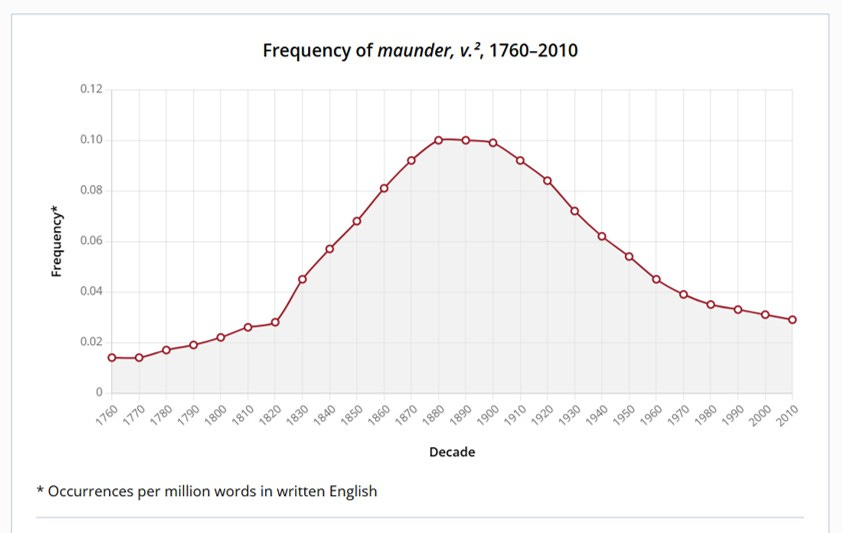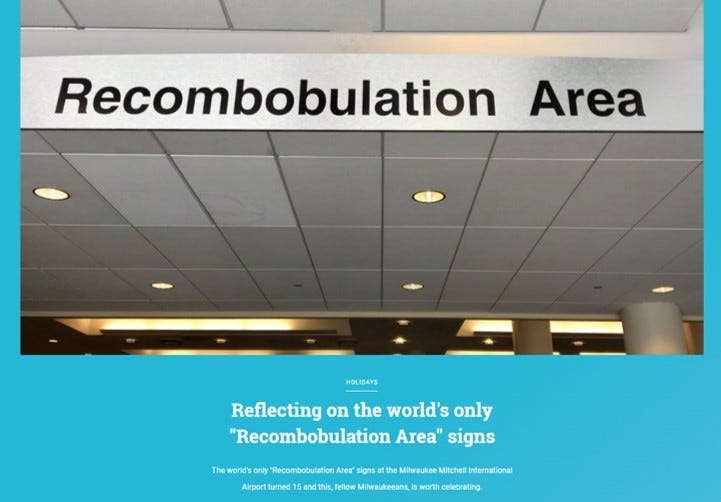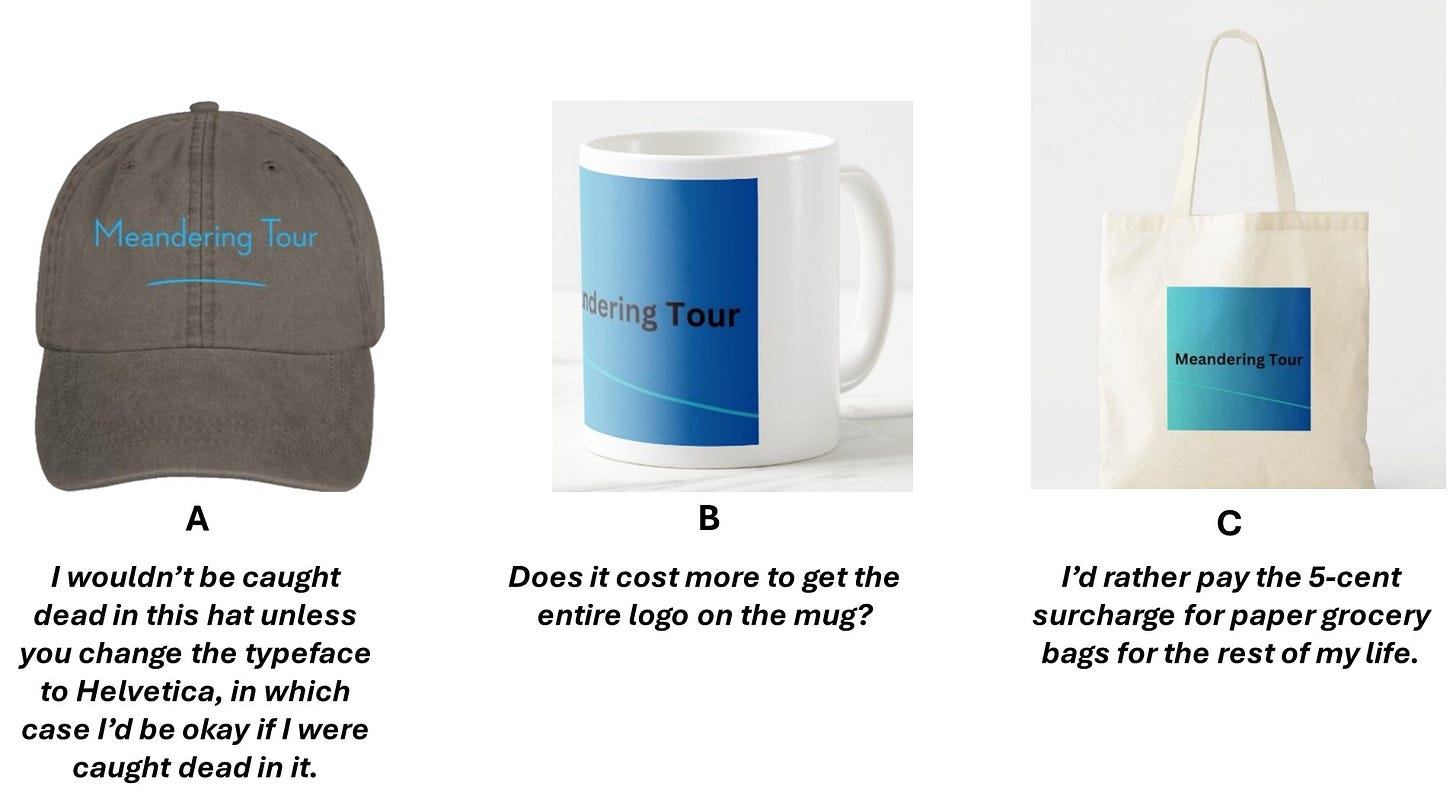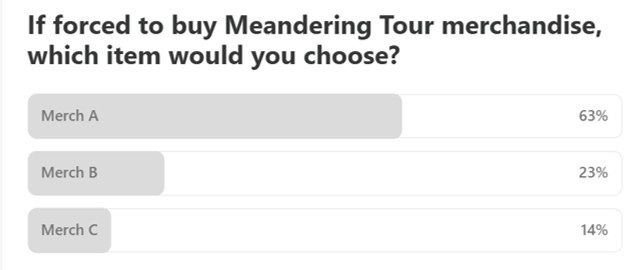5) AnxIety
I was going to write an essay today on rising concerns about artificial intelligence, not by rambling on as I usually do (well, not just that) but by providing links to credible analyses and lectures as a kind of primer on the subject. I decided not to, for three reasons:
A higher authority recently addressed the subject. On Saturday, Villanova alum and Chicago White Sox fan Pope Leo XIV identified AI as one of the main issues facing humanity, saying it poses “new challenges for the defense of human dignity, justice and labor.”
Last week, I published my first serious essay, about the current state of political discourse, and some suggested it should be my last.
My niece Nora, a business executive, composer, and chanteuse, sent me something that reflects one of the key points I was going to make: a song generated by a platform called DeepAI.org in response to the following prompt she wrote:
Write a theme song for the Substack written by Scott Sherman called Meandering Tour. The song should sound like James Taylor and make self-deprecating jokes about his obsession with grammar and sweating the small stuff.
The result, after about 30 seconds, is this tune, sung in a Taylor-like voice, backed by “his” crystal clear acoustic guitar, and including verses such:
Adverbs haunt my midnight dreams Overanalyzing punctuation schemes Jokes about semicolons abound In this world, I’m grammar-bound.
The DeepAI version that a now deeply-concerned Nora used is free to the public. Imagine what the more advanced releases can accomplish.
If you’ll allow me, I’ll elaborate next week about the dangers of . . . . Oh, wait, The New York Times just reported that an avatar of the deceased British novelist Agatha Christie is teaching an online writing course. “She has been reanimated,” according to the Times, “with the help of a team of academic researchers — who wrote a script using her writings and archival interviews — and a ‘digital prosthetic’ made with artificial intelligence and then fitted over a real actor’s performance.”
I’m not a Luddite. Indeed, I am optimistic that AI will yield extraordinary benefits (in health care, biomedical research, education, manufacturing, climate control, occupational safety), but there are significant dangers (degraded learning skills, job displacement, copyright infringement, troubling human-machine relationships, biohazards, warfare) that call for regulatory safeguards1 and global treaties.
More to come on this subject in future columns.
If you can’t wait and/or prefer to hear from true experts in the field, check out this essay by Tyler Cowen, an economist and blogger extraordinaire, and Avital Balwit, an executive at Anthropic, the company that launched the AI platform known as Claude.
“We are not doomers; quite the opposite,” they write. “Both of us have an intense conviction that this technology can usher in an age of human flourishing the likes of which we have never seen before. But we are equally convinced that progress will usher in a crisis about what it is to be human at all.”
4) Seinfeld Subterfuge
In a 1998 episode of Seinfeld, called "The Burning,"2 Kramer and his friend Mickey land acting jobs to feign medical conditions to help train medical students. Kramer is distressed about being typecast when he is assigned to “perform gonorrhea” two weeks in a row.
I was reminded of this episode when I read an article in Nature about a recent test of the capabilities of Google’s medical chatbot, known as Articulate Medical Intelligence Explorer, or AMIE (see how I snuck AI back in here). In the study, which has not yet been peer reviewed, 25 actors, playing patients, had virtual consultations with AMIE and a human primary care physician. The actors, who shared PDFs of lab results and electrocardiograms, simulated 105 different scenarios, including a variety of symptoms and medical histories.
“After each consultation,” according to the paper, titled “Advancing Conversational Diagnostic AI with Multimodal Reasoning,” “both AMIE and the human doctor suggested a diagnosis and a treatment plan. A team of 18 specialists in dermatology, cardiology and internal medicine evaluated the performances of the chatbot and the human doctors by analysing transcripts of the visits and the post-visit reports. They found that, in general, AMIE achieved greater accuracy in its diagnoses than did the human doctors.”
Your iDoc will see you now.
Wait, my eyes are fine.
3) “Unparalleled Misalignments”
I mentioned Tyler Cowen in my first piece above. He’s a hyperlexic polymath, recently profiled in The Economist, who, along with his colleague Alex Tabarrok, blogs daily about subjects far and wide on his web site Marginal Revolution. If you want to learn something new, interesting, and valuable every day, from the quirky to the profound, subscribe here.
Take a look, for example, at last Wednesday’s list of assorted links, which covered subjects ranging from British philosopher Galen Strawson and Catholic cardinals watching the movie Conclave to naval ship construction and why recent tariff increases failed to raise the value of the dollar.
What I focused on was Cowen’s link to “Unparalleled Misalignments,” a list compiled by a quantitative trader named Ricki Heicklen. The list, which she has maintained since 2018, consists of over 600 “pairs of non-synonymous phrases where the words in one phrase are each synonyms of the words in the other,” such as:
Blanket statement // Cover story Smarty pants // Intelligence briefs Earnings call // Payphone No Shit // Bar Stool Cancel culture // Anti-bacterial Blood vessel // Relationship Microchips // Small Fries Forest fire // Amazon Kindle Okay Boomer // KPop
I say, Top-notch // Prime Cut. You can submit your own UMs to Heicklen here.
2) Reader Mail
Poetic Justice: When I received a note from Nicholas Delbanco, Robert Frost Distinguished University Professor Emeritus of English at the University of Michigan, I assumed he was sending a rebuke of my juvenile and blasphemous comments about poetry. Maybe he was a member of some kind of roving poetry posse, come to drag me away to the poetic pokey. I was mistaken. Nick, a prolific writer and scholar, merely wanted to compliment my “meanderings not maunderings.” I had never before seen or heard the latter word. According to the Oxford English Dictionary, the verb “maunder” means to “talk in a dreamy, rambling, or incoherent manner; to ramble or wander in one's talk.”3 Thank you, Professor, although I must admit that I’ve received complaints from other readers accusing me of incoherent and rambling writing; they just didn’t know there’s a rarely-used word for it.
Rhyme Crime: In a comment that appeals to my own love of and need for symmetry and consistency, Todd Cleary wrote this thoughtful remembrance, weaving together three themes from my May 1st newsletter: poetry, three-named celebrities, and a commonplace:
Ray, my dad, would often read “The Children’s Hour” by Henry Wadsworth Longfellow (three names) to me at bedtime. That poem was the genesis for “My List of Peeves” in my commonplace. Thanks to Henry, the first entry on that now long list is: “Poems with forced rhymes.”
The second and fourth lines of “The Children’s Hour” stanzas pair beautifully:
Feet / Sweet
Stair / Hair
Eyes / Surprise
Hall / Wall
Chair / Everywhere
Entwine / Rhine
Wall / All
Depart / Heart
Day / Away
All well and good. But, close to 70 years ago and to this day, I have been peeved by the first stanza:
Between the dark and the daylight,
When the night is beginning to lower,
Comes a pause in the day’s occupations,
That is known as the Children’s Hour.
I used to be a regular churchgoer, and on Sundays, the hymn “We Plough The Fields, and Scatter” by Matthias Claudius was a staple of the annual church rotation. The hymn contained three stanzas and one refrain with the following rhymes.
Land / Hand
Grain / Rain
Above / Love (Refrain)
Far / Star
Fed / Bread
Above / Love (Refrain)
Good / Food
Imparts / Hearts
Above / Love (Refrain)
In an otherwise respectable hymn, we get ambushed by Good / Food. I can’t imagine a time in the evolution of the English language when those two words ever rhymed. Seriously, Matthias? Sheesh.
Well said, Todd. I agree. When you have a moment, by the way, I’d to discuss the double dactyl and other poetry rhyme schemes with you.
Gruntled: Andy Lapayowker replied to my piece on pseudo-opposites created by dropping prefixes, e.g., combobulated, gruntled, consolate, and chalant. He cited an article in OnMilwaukee about a “recombobulation” sign at Milwaukee Mitchell International Airport. Thank you, Andy. I find your sign (first photo below) much more fusing than the display I used to encounter at Albany International Airport (second photo).
1) Merch Survey Results
The verdict is in: 63% of survey respondents said they would choose the baseball cap, 23% the coffee mug, and 14% the tote back — if they were “forced” to buy Meandering Tour merch, and subject to the eventual price. (See the product display and rigorously scientific survey results below.)
These data are a ringing endorsement of a product line that an initial focus group called “hideously ugly,” with one panel member denouncing the style as “PPE2,” or PowerPoint Early 2000s.
Despite the Shark Tank-like promise of these fashion accessories, I cannot in good conscience rush them to market, given the current vagaries of international trade and the resulting price uncertainty. Thank you for your patience.
In February, PBS reported that Vice President JD Vance, in his first major policy speech, “warned global leaders and tech industry executives that ‘excessive regulation’ could cripple the rapidly growing artificial intelligence industry in a rebuke to European efforts to curb AI’s risks.” And the House Energy and Commerce Committee’s new budget reconciliation bill includes a decade-long moratorium on state regulation of artificial intelligence.
Season 9, Episode 16
Wiktionary defines the verb as follows: “to speak in a disorganized or desultory manner; to babble or prattle,” Meriam-Webster (second meaning) like this: “to talk at length without sticking to a topic or getting to a point.”











Re: feigning symptoms. In one of my frequent confluences with MT, I wrote this week about interviewing Milos Forman in 1981. He told me several remarkable stories. His first American film was critically praised but a bomb. He fell into an emotional black hole. His fellow immigrant Czechoslovakian director Ivan Passer was convinced Forman needed psychiatric help, but Forman wouldn’t go.
Unbeknownst to Forman, Passer began seeing a psychiatrist but pretending to have Forman’s problems. Passer relayed the shrink’s advice to his friend, passing it off as his own. It’s kind of amazing that nobody turned that into a movie.
Love this..I'm inspired to look for shitty rhymes...or even better, assign the task to AI.....